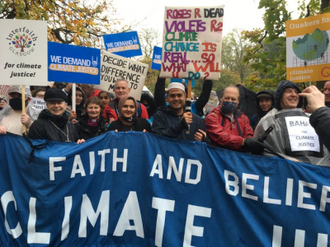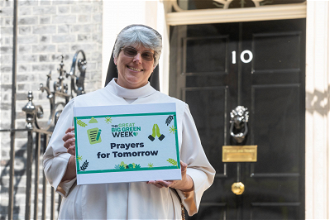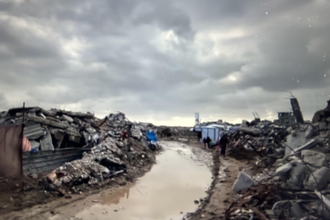Viewpoint: 'The sooner we get the climate under control the better'

Faiths for Climate Justice at COP26 in Glasgow
Countries attending COP28 in the United Arab Emirates last December had wanted an agreement that would include an explicit commitment to phase out or even phase down fossil fuels. Instead, the 2023 United Nations Climate Change Conference reached a consensus that called on countries to contribute to global efforts to transition, "away from fossil fuels in energy systems in a just and equitable manner, so as to achieve net zero by 2050 in keeping with the science."
COP28 President, Sultan Al Jaabr, called the deal a comprehensive response to the global stocktake that had revealed countries were not living up to the goals of the Paris Climate Agreement, which included the aim to try to limit global heating to 1.5C above pre-industrial times.
However, global temperature records for the last ten months have been broken and scientists are anxiously waiting to see for how long this continues. 2023 was the hottest year on record and the impacts of the climate crisis are becoming increasingly and devastatingly clear. Yet major oil and gas companies have failed to set meaningful targets to reduce their emissions, all the while spreading climate disinformation and attempting to greenwash their businesses. They are expanding their production of oil and gas despite the need to rapidly phase out fossil fuels and decarbonise our energy system. It's time to make it clear that business as usual cannot continue.
Scientists of the IPCC (Inter-Governmental Panel on Climate Change) have repeatedly said that to control climate change what is required is, deep, rapid and sustained reductions of greenhouse gas emissions, which would lead to discernible slowdown in global warming within around two decades." Just this week we have heard - based on data from the EU's Copernicus Climate Service - how super-heated oceans have hit marine life hard and driven a new wave of coral bleaching. But since COP28 many nations and fossil fuel companies have instead increased their production of fossil fuels and exploited new sources. The major fossil fuel companies seem intent on carrying on with their present extraction of fossil fuels that is giving them huge profits, yet a transition away from fossil fuels must include a decline in the production and use of fossil fuels, with a goal to get to zero.
The United Nations Framework Convention on Climate Change (UNFCCC) was adopted in 1992 with the ultimate aim of preventing dangerous human interference with the climate system. The 1997 Kyoto Protocol and 2015 Paris Agreement have built on the Convention. COP stands for Conference of the Parties and is the main decision-making body of the UNFCCC. Nearly 200 countries are involved.
The amount of contribution that each country will be asked to undertake towards 'the transition away from fossil fuels" will only be decided at COP29 later this year. This will be held in November 2025 in Azerbaijan. To avoid ultimate disaster the member nations of the UNFCCC must reduce their emissions now and in COP29 pass a consensus that all fossil fuel outlets are phased out as soon as possible and no new sources of greenhouse gases are exploited.
So, to save the world from runaway climate change, COP29 must agree and put into immediate effect what the IPCC says is needed - a rapid and massive reduction of emissions - and this only be possible if the COP nations make it their one and only policy at that meeting.
Here in the UK, the outgoing secretary of the UK's Climate Change Committee (CCC), Chris Stark, said last month that Downing Street has sent a message to the rest of the world that, "the UK is less ambitious on climate than it once was, and that is extremely hard to recover". Rishi Sunak has "set us back" on climate change and left the UK at risk of falling behind other countries, the head of the government watchdog said. The CCC is a statutory body that gives independent advice to ministers and assesses progress on targets. "I think people around the world know climate change is happening, but there is definitely a fear of talking about it in British politics at the moment," said Chris Stark.
I feel the public should know that unless we are able to bring climate change under control in the very near future the continuous heating of the planet's global temperature would exceed the present target of 1.5C above pre-industrial times with terrible consequences for the world's population.
The people of the world are currently suffering from heatwaves, storms, floods and wildfires and droughts leading to food insecurity and these will get worse as the global temperature increases. Countries in South and Southeast Asia have been coping with a weeks-long heatwave which has seen record temperatures sweep parts of the region. Pupils in the Philippines, India and Bangladesh have been told to stay at home and learn remotely due to a severe health risk. So, the sooner we get the climate under control the better.
Members of the public in this country and in the other COP nations must do their best to achieve the above through their own efforts and via climate change organisations.
Reggie Norton is a member of Operation Noah, Green Christian and Christian Climate Action.
LINKS:
Green Christian: https://greenchristian.org.uk/climate-and-creation-emergency/
Operation Noah: https://operationnoah.org/
Christian Climate Action: https://christianclimateaction.org/


















